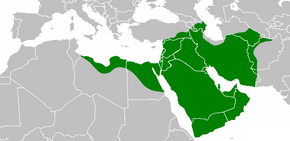| Umar | |
|---|---|
| Amir al-Mu'minin Al-Farooq | |
 Caliph Umar's empire at its peak, 644. | |
| Reign | 23 August 634–7 November 644 |
| Predecessor | Abu Bakr |
| Successor | Uthman |
Umar ([undefined] Error: {{Lang-xx}}: no text (help), c. 586-590 CE – 7 November, 644), also known as Umar the Great or Farooq the Great was the most powerful of the four Rashidun Caliphs and one of the most powerful and influential Muslim ruler.[1] He was a sahaba (companion) of Prophet Mohammad. He succeeded Caliph Abu Bakr (632-634) as the second Caliph of Rashidun Caliphate on 23 August 634. He was an expert jurist and is best known for his justice with Muslims and non-Muslim subjects alike, that earned him the title Al-Farooq (The one who distinguish between good and bad) and his house as Darul Adal (house of justice). Under Umar Islamic empire expanded at an unprecedented rate annexing whole of Sassanid Persian Empire and more then two third of Eastern Roman Empire. His legislative abilities, his firm political and administrative control over rapidly expanding empire and his brilliantly coordinated multi-prong attacks against Sassanid Persian Empire that resulted in conquest of Persian empire in less then two years, marked his reputation as one of the political and military genius of the world.[2] It was Umar who for the first time in 500 years since expulsion of Jews from the Holy Land, allowed them to practice their religion freely and live in the Jerusalem. Religiously a controversial figure in the Muslim world, Umar is regarded by Sunni Muslims as one of four Rashidun or rightly guided caliphs who were true successors of Prophet Mohammad, in stark contrast, regarded by Shi'a Muslims as unjust in his usurpation of Ali's right to the caliphate, indeed as the principal political architect of opposition to Ali. According to Shia Muslims, Fatimah, wife of Ali and daughter of Muhammad, was abused by him and it is believed the event caused her to miscarry her child and eventually led to her death soon after.[3][4] (see Umar at Fatimah's house).
- ^ Ahmed, Nazeer, Islam in Global History: From the Death of Prophet Muhammad to the First World War, American Institute of Islamic History and Cul, 2001, p. 34. ISBN 073885963X.
- ^ http://www.jewishvirtuallibrary.org/jsource/History/Caliphate.html
- ^ http://books.google.com/books?id=zot5IK1csp0C&pg=PA19&dq=&lr=
- ^ http://books.google.com/books?id=vGhp8Obm3bgC&pg=PA45&dq=&lr=